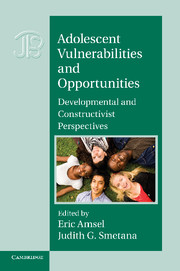Book contents
- Frontmatter
- Contents
- Figures and Tables
- Series Editor’s Preface
- Preface
- 1 Constructivist Processes in Adolescent Development
- Part I Biological And Cognitive Perspective
- 2 Structural Brain Magnetic Resonance Imaging of Typically Developing Children and Adolescents
- 3 Adolescent Risk Taking: A Social Neuroscience Perspective
- 4 What Are the Cognitive Skills Adolescents Need for Life in the Twenty-First Century?
- 5 Hypothetical Thinking in Adolescence: Its Nature, Development, and Applications
- PART II Social and Contextual Perspective
- Index
- References
4 - What Are the Cognitive Skills Adolescents Need for Life in the Twenty-First Century?
from Part I - Biological And Cognitive Perspective
Published online by Cambridge University Press: 07 October 2011
- Frontmatter
- Contents
- Figures and Tables
- Series Editor’s Preface
- Preface
- 1 Constructivist Processes in Adolescent Development
- Part I Biological And Cognitive Perspective
- 2 Structural Brain Magnetic Resonance Imaging of Typically Developing Children and Adolescents
- 3 Adolescent Risk Taking: A Social Neuroscience Perspective
- 4 What Are the Cognitive Skills Adolescents Need for Life in the Twenty-First Century?
- 5 Hypothetical Thinking in Adolescence: Its Nature, Development, and Applications
- PART II Social and Contextual Perspective
- Index
- References
Summary
For many years, Inhelder and Piaget’s (1958) theoretical framework has served as a guide for examining cognitive changes emerging during the second decade of life. More recently, excitement has been generated by the identification of developments in the brain through the second decade that may be implicated in cognitive changes that occur during this decade (see Keating, 2004; Kuhn, 2006, 2009, for review). Yet the concepts of adolescent thinking becoming more formal, more abstract, and/or more systematic have yet to be firmly anchored in the day-to-day realities of how adolescents think about matters of consequence to them and how they need to think in order to engage effectively in the modern world (Kuhn, 2008). Moreover, most of the empirical evidence related to adolescent cognitive skills does not present a picture of strong and secure competence, making the question of how to support cognitive development in adolescence a pressing one.
In the first part of this chapter, we identify three areas of cognitive competence that we argue are critical to adolescents’ development if they are to engage optimally in twenty-first-century society. In the second part of the chapter, we describe some of our own efforts to support such development through the design of curricula to develop cognitive skills during what we argue is the critical period of early adolescence.
- Type
- Chapter
- Information
- Adolescent Vulnerabilities and OpportunitiesDevelopmental and Constructivist Perspectives, pp. 65 - 85Publisher: Cambridge University PressPrint publication year: 2011
References
- 2
- Cited by

